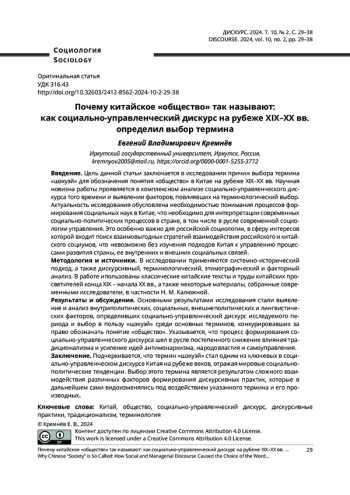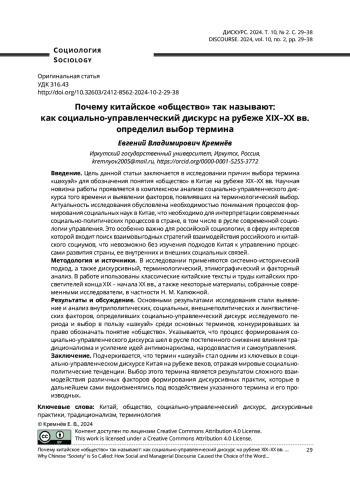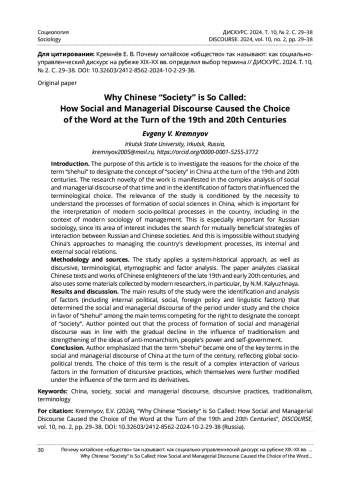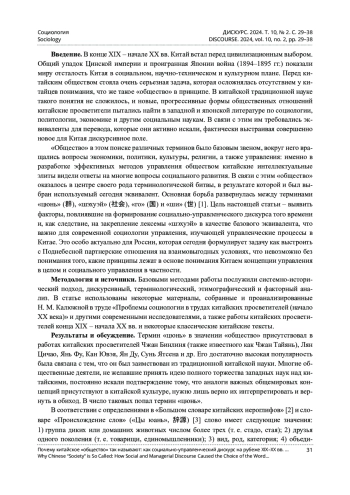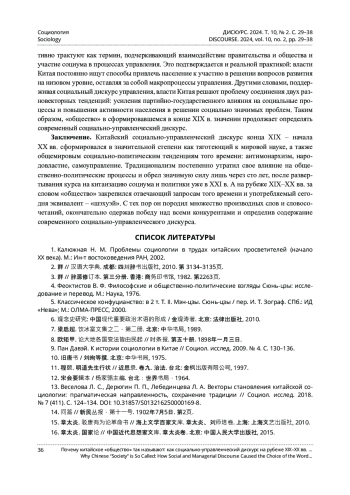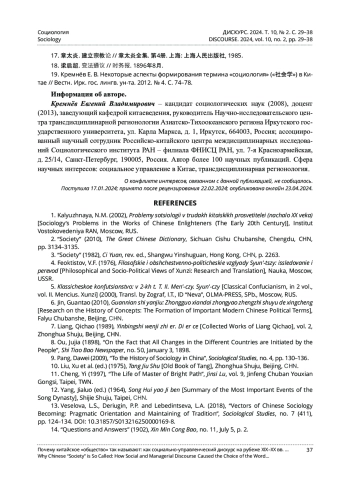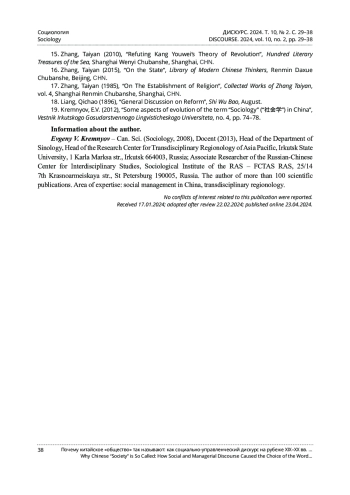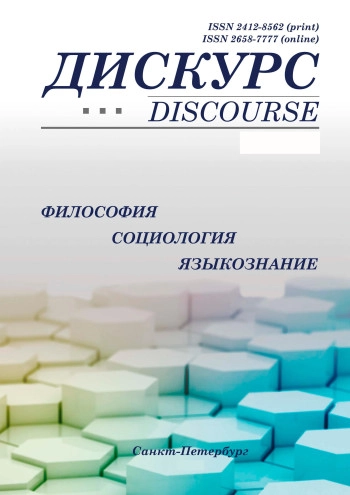Введение. Цель данной статьи заключается в исследовании причин выбора термина «шэхуэй» для обозначения понятия «общество» в Китае на рубеже XIX-XX вв. Научная новизна работы проявляется в комплексном анализе социально-управленческого дискурса того времени и выявлении факторов, повлиявших на терминологический выбор. Актуальность исследования обусловлена необходимостью понимания процессов формирования социальных наук в Китае, что необходимо для интерпретации современных социально-политических процессов в стране, в том числе в русле современной социологии управления. Это особенно важно для российской социологии, в сферу интересов которой входит поиск взаимовыгодных стратегий взаимодействия российского и китайского социумов, что невозможно без изучения подходов Китая к управлению процессами развития страны, ее внутренних и внешних социальных связей. Методология и источники. В исследовании применяются системно-исторический подход, а также дискурсивный, терминологический, этимографический и факторный анализ. В работе ипользованы классические китайские тексты и труды китайских просветителей конца XIX - начала XX вв., а также некоторые материалы, собранные современными исследователи, в частности Н. М. Калюжной. Результаты и обсуждение. Основными результатами исследования стали выявление и анализ внутриполитических, социальных, внешнеполитических и лингвистических факторов, определивших социально-управленческий дискурс исследуемого периода и выбор в пользу «шэхуэй» среди основных терминов, конкурировавших за право обозначать понятие «общество». Указывается, что процесс формирования социально-управленческого дискурса шел в русле постепенного снижение влияния традиционализма и усиление идей антимонархизма, народовластия и самоуправления.
Заключение. Подчеркивается, что термин «шэхуэй» стал одним из ключевых в социально-управленческом дискурсе Китая на рубеже веков, отражая мировые социально[1]политические тенденции. Выбор этого термина является результатом сложного взаимодействия различных факторов формирования дискурсивных практик, которые в дальнейшем сами видоизменялись под воздействием указанного термина и его производных.
Introduction. The purpose of this article is to investigate the reasons for the choice of the term “shehui” to designate the concept of “society” in China at the turn of the 19th and 20th centuries. The research novelty of the work is manifested in the complex analysis of social and managerial discourse of that time and in the identification of factors that influenced the terminological choice. The relevance of the study is conditioned by the necessity to understand the processes of formation of social sciences in China, which is important for the interpretation of modern socio-political processes in the country, including in the context of modern sociology of management. This is especially important for Russian sociology, since its area of interest includes the search for mutually beneficial strategies of interaction between Russian and Chinese societies. And this is impossible without studying China’s approaches to managing the country’s development processes, its internal and external social relations. Methodology and sources. The study applies a system-historical approach, as well as discursive, terminological, etymographic and factor analysis. The paper analyzes classical Chinese texts and works of Chinese enlighteners of the late 19th and early 20th centuries, and also uses some materials collected by modern researchers, in particular, by N. M. Kalyuzhnaya. Results and discussion. The main results of the study were the identification and analysis of factors (including internal political, social, foreign policy and linguistic factors) that determined the social and managerial discourse of the period under study and the choice in favor of “shehui” among the main terms competing for the right to designate the concept of “society”. Author pointed out that the process of formation of social and managerial discourse was in line with the gradual decline in the influence of traditionalism and strengthening of the ideas of anti-monarchism, people’s power and self-government.
Conclusion. Author emphasized that the term “shehui” became one of the key terms in the social and managerial discourse of China at the turn of the century, reflecting global socio[1]political trends. The choice of this term is the result of a complex interaction of various factors in the formation of discursive practices, which themselves were further modified under the influence of the term and its derivatives.
